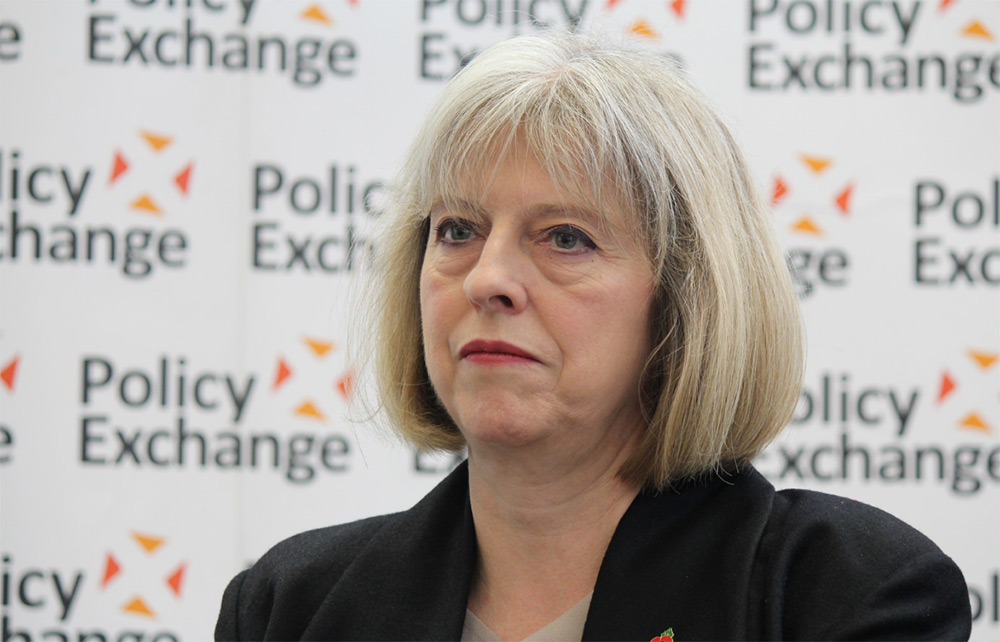An online petition demanding that the UK government repeal the newly installed surveillance laws made possible by the Investigatory Powers Bill has now passed the threshold for debate in parliament. It needed at least 100,000 signatures, but has continued on since then and is closing on on 120,000 at the time of writing.
The Investigatory Powers Bill is a piece of legislation that mandated the collection of “internet connection records,” or the top-level browsing history of every British citizen at the IP level, as well as mass hacking of citizen hardware if required by a criminal investigation. These are measures that many members of the public are hugely concerned by and campaigned against it, but the bill passed through parliament with only perfunctory amendments.
Recently appointed PM, Theresa May had been driving the IPB forward for years before her recent promotion. Source: PolyExchange/Flickr
To try and combat that, opponents of the bill and its legal measures have been driving up the official petition and it's certainly been effective. It quickly passed the 10,000 signatures required for the standing government to issue an official response to the petition and now by passing the 100,000 mark it will be considered for debate in parliament.
Considering there wasn't much in the way of opposition by politicians of either major party, it seems unlikely that any debate would be too favourable, but it's hoped that with the outpouring of support for the petition and some of the negative press surrounding the bill, it will help change politician's minds.
It's not the only petition that's been gaining traction recently either. Privacy focused Open Rights Group has generated more than 10,800 signatures for its anti-Digital Economy Bill petition.
Discuss on our Facebook page, HERE.
KitGuru Says: The UK is swimming with anti-privacy/freedom online legislation at the moment. Despite its generally liberal, western ideals, it now has some of the most unrestricted surveillance laws in the world.
 KitGuru KitGuru.net – Tech News | Hardware News | Hardware Reviews | IOS | Mobile | Gaming | Graphics Cards
KitGuru KitGuru.net – Tech News | Hardware News | Hardware Reviews | IOS | Mobile | Gaming | Graphics Cards




The UK governments incompetence when it comes to technology in general,continues to baffle me.
I don’t really get what the investigatory powers bill is meant to achieve. Unless I’ve been given misinformation from what I’ve read only 48 bodies can access this information. This includes the Police (understandably), GCHQ (Kinda pointless since they have much more detailed information stretching far further than 12 months already), and various bodies that don’t make sense such as emergency services, the gambling commision and some food/nutrition thing. Why would they ever need access to the browsing history?
Secondly is the information they actually receive. They see what websites you’ve visited but not specific pages. What’s this meant to achieve? Take for example a suspected paedophile: Sure, he’s looked at some porn sites but unless they’ve gone on to some that specifically and exclusively deals with child porn then there’s no evidence of anything illegal.
Adding onto that, any site that does deal exclusively with anything outright illegal would more often than not be located in the dark web which would have countermeasures against the things Snoopers Charter is tracking.
So again, what’s the point?
It is IMO, a foot in the door and the start of a slippery slope. This law is not about porn or what we watch or to counter terrorism, it is about control, it starts as tracking data, and down the line in 10 years becomes raids based on “possible threats” that may or may not have ever been a threat and in 20 years time you are profiled by your data which is collected from every device you interact with and you are prosecuted based on your potential to commit a crime, the possibility that you might commit a crime, rather than for actually committing a crime. Sounds far fetched, but this is the only way this law and laws like it will lead, an utterly Orwellian looking future. Where you can no show descent towards the people in power for fear of being imprisoned as a criminal, where you either comply 100% or rot in a jail cell for life.
That or this bill serves as a line of finance for the government, them, selling off our data for profits so the buyers of this data can target advertisements, much like what facebook and other social media platforms do with the things you like.